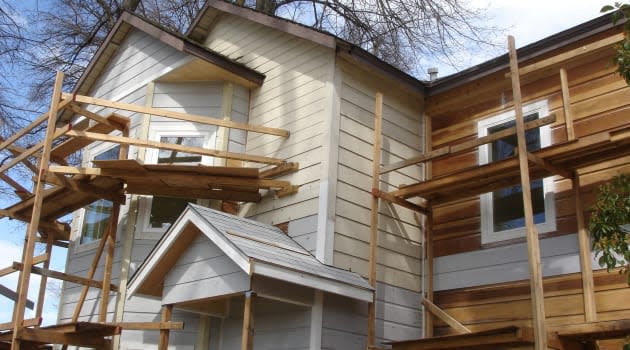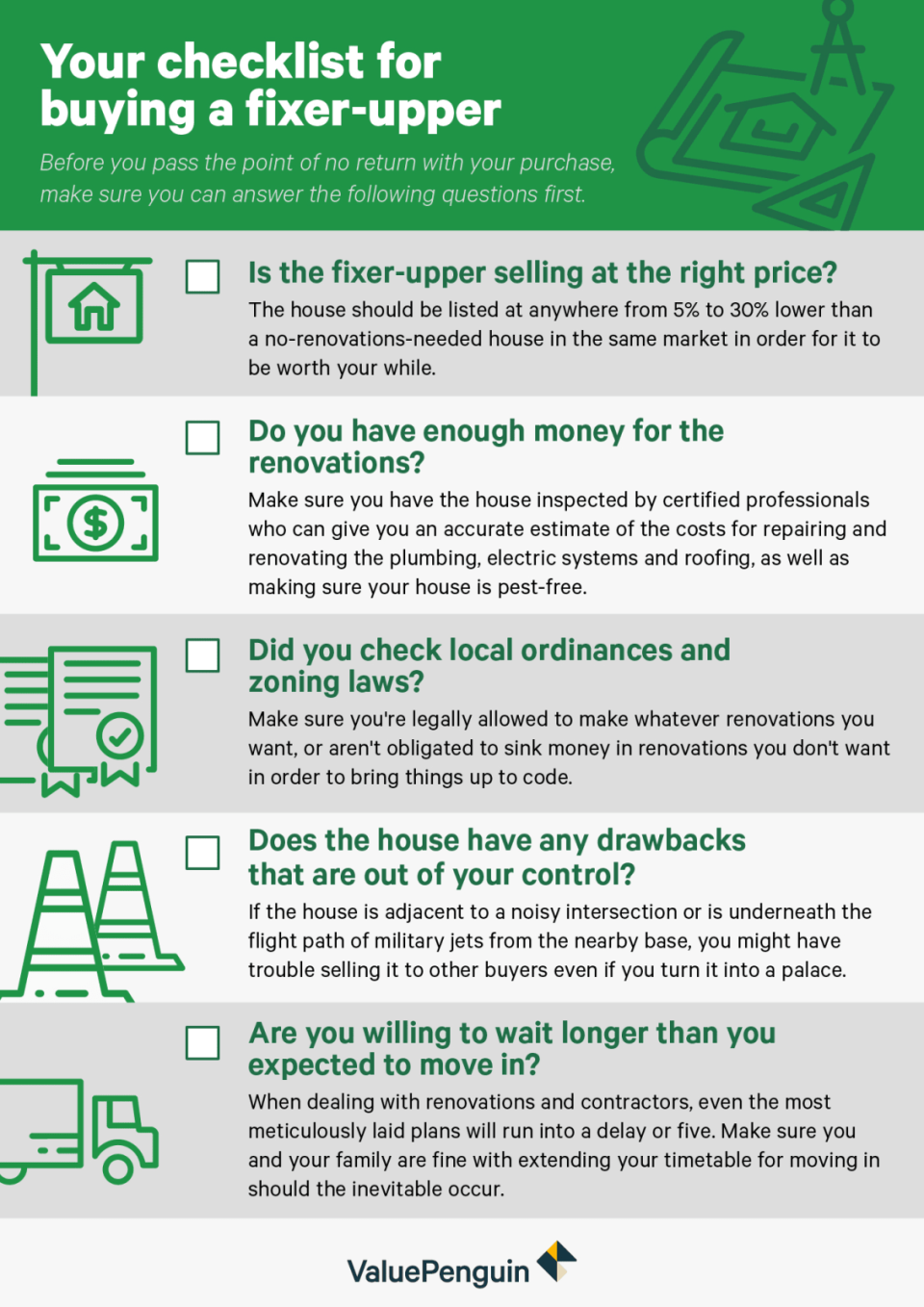Is Buying a Fixer-Upper Worth It?

Most millennials still view owning a home as part of the American Dream, a worthy goal to work toward. But rising student loan debt and increasing property prices across the U.S. are making it harder for this same group to save up enough money just for a down payment, let alone the expensive home renovation that can come with buying a house. In fact, property experts anticipated U.S. housing prices to rise 10% from 2017 to 2018, driven mostly by a lack of new homes, low interest rates and steadily increasing demand, according to a Reuters survey.
Rather than holding off on buying altogether, eager would-be homeowners—especially avid fans of DIY renovation shows such as Property Brothers— might instead turn to buying a fixer-upper and tackling the home renovation that comes along with it. According to a survey conducted by Home Depot, 64% of millennials said they could complete an entire room remodel project without any help from a professional. Ashleigh Allman, 36, and her husband certainly thought they could tackle on their own the home renovation needed for the fixer-upper they purchased in Knoxville, Tennessee, in 2013, but they didn't anticipate the amount of time it would take. “We’ve had several accidents push our renovations behind, like busting a pipe with a nail gun and hitting a gas line,” Allman said. “We love our house, but it takes much longer than the shows on HGTV would lead you to believe, especially when you’re doing all the work by yourself.”
While the Allmans are still excited for the picture-perfect after on their DIY home renovation, they thought their fixer-upper would be completely renovated within five years for about $30,000. Instead, they are just now completing the first phase, and they’re about $10,000 over budget. Whether you’re on the fence about buying a fixer-upper or ready to roll up your sleeves , sledgehammer in hand, here are the considerations to think through so you don’t find yourself years into costly repairs with no end in sight.
Do the math
Would-be homeowners considering buying a fixer-upper should start the process by making sure you have all the necessary funds you would need for a move-in ready home, plus the added budget necessary for additional home renovations. “If a couple is set on buying a fixer-upper, I advise them to get the house inspected by a qualified inspector, and to walk through the home and pay close attention to everything that needs to be fixed,” said Anthony N. Badillo, CFP and lead planner at Gen Y Planning. “Unless you’re a carpenter, electrician and plumber, you’ll want to do research and obtain quotes on what the necessary repairs and renovations will cost. If you don’t have this amount in cash or some other vehicle—like stock options, gifts or inheritance—earmarked for repairs, then I don’t recommend you move forward with the purchase.”
The costs in money and time for your home renovation varies widely depending on the type of improvement you're attempting. For example, a kitchen remodel including new floors, appliances, cabinets and countertops could run anywhere from $20,000 to $30,000, said Jeff Lawrence, general contractor and owner of northern Colorado based-Lawrence Home Improvements, LLC, while a bathroom usually falls between $15,000 and $20,000. Lawrence warns home buyers to also be wary of mold, water damage and outdated electrical systems. “These are things that can turn into a very expensive fix, very fast,” he said.
What to consider before buying a fixer-upper
Purchasing any home requires a certain level of research, but when you have a home renovation in your future, there are some additional things to think about. To start, you’ll want to make sure the fixer-upper you fall in love with won’t turn out to be a money pit. In the real estate world, there are a lot of levels of fixer-upper, ranging from uninhabitable to cosmetic, said Elizabeth Hotz, broker with Kentwood Real Estate based in Denver. “I typically think of a true fixer-upper as a property that requires work to be done to live in the home comfortably,” Hotz said. With that in mind, some additional questions you need to ask yourself include:
Are you getting the best deal? Most agents and sellers consider the condition with regards to pricing a home, said Hotz. Depending on the amount of work needed, a fixer-upper could be priced anywhere from 5% to 30% lower than a comparable property that is move-in ready. To figure out if the fixer-upper you’re eyeing is worth it, add the estimated price of repairs (Lawrence suggests an additional 15% for padding) to the selling price of your home, and see how close it comes to move-in ready houses of comparable size in the same area. Keep in mind that out-of-pocket expenses aren’t your only “cost” with a fixer-upper—it could take a decent amount of time before everything is finished as well.
Are there additional features that make it attractive? Even if you have the money for repairs, and the financial cost of buying and renovating your fixer-upper checks out when compared to newer homes, there are still a few other things to consider. “I typically try to avoid properties that are located on or back up to busy streets or other undesirables, like commercial buildings, landfills and power lines,” said Hotz. “Those homes are already facing a resale challenge that cannot be changed. So they may be more affordable on the purchase side, but they will still have the same obstacles when you go to sell.” Lawrence also warns home buyers against overbuilding. “If your house will be the only one in a neighborhood with stainless steel appliances and granite counters, chances are you will not recoup as much on your investment,” he said.
Have you considered possible legal snags? Try to factor in any local laws and regulations that could impact your desired changes. When Brianna Eldridge, 30, and her husband were in the market for a fixer-upper that they could also use as an office for their business, they fell in love with a house in a commercial/residential highway zone in the downtown section of North Conway, New Hampshire. After buying their place, they discovered that an influx of new bylaws and codes added unexpected and expensive wrinkles to their plans. “One major surprise was that we couldn’t keep our septic tank and had to hook up to the town sewer,” said Eldridge. “That was a major undertaking and something we weren’t prepared for at all. I would recommend doing your research by going to the local town inspectors office to pick their brains.”

Your Fixer-Upper Checklist for Before You Buy
Do you need a home renovation loan?
Without cash in hand, many home buyers turn to loans and other programs to help fund a home renovation. Learning what these options are ahead of time can save a lot of headaches down the road. Some options include:
The Federal Housing Administration 203(k). This FHA account allows home buyers to finance up to $35,000 into their mortgage in order to repair, improve or upgrade their home. Learn more here.
The Fannie Mae HomeStyle Renovation Mortgage. With this mortgage option, Fannie Mae gives borrowers the ability to renovate their home by including financing in their conventional purchase or by allowing them to refinance their home loan. Learn more here.
Lender home renovation loans. Do a little digging to see if other traditional lenders might be able to offer a home improvement or personal loan in the amount you need for a reasonable APR. Learn more here.
Besides loans, Denver resident Matt Holmes, 30, recommends looking for homes with extra rooms or space to add a bedroom to rent to help offset costs. So far he has purchased four homes, two of which he still owns and two of which he flipped over the past seven years. “I always look for a floor plan where I can add a bedroom,” he said. “It’s one of the cheapest renovations, but in Denver, it’s worth about $700 to $900 per month once you put a roommate in there.”
With a little research on how to buy a fixer-upper and a lot of love for DIY home renovation, purchasing a house that needs some updating can be a fun way to add your personal stamp to your own place. Just make sure you’ve done the math and consulted with the experts before signing on the dotted line.

 Yahoo Finance
Yahoo Finance 